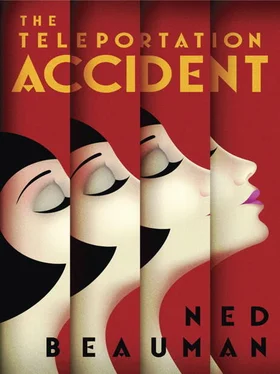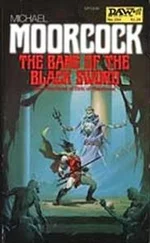‘Of course I fucking wondered! How many women have you brought here?’
‘A good deal. When you’re out. They can hardly receive me at home, can they? They’re millionaires’ wives. The servants would talk. And my house in Venice Beach is an hour’s drive away. Los Angeles is so spread out. Why do you think I was so keen for you to take this place? And so helpful about bringing you the key after I got it from Woodkin? I hope you haven’t forgotten that when I got you that first invitation to dinner at Gorge’s house, you said you’d owe me a favour.’
There were quite a lot more questions Loeser wanted to ask, but in his bewilderment he could only manage: ‘So why are you still nude?’
‘It’s a warm night for December. Now, old chap, I really must find these nail scissors — might you have any idea where they are?’
‘I can promise it will be much better for Delia Sprague’s peace of mind if I don’t tell you. Just get your clothes.’
The skunk’s colleague gathered his clothes, went into the bathroom to get dressed, and came back out. ‘You know, as it happens, I could ransack a pot of tea: I don’t suppose before I go I could just—’
‘No,’ said Loeser.
‘By the way, have you heard about Brecht?’
‘What about Brecht?’
‘He’s coming to Los Angeles. He’s in Finland now, but he’s going to apply for a visa.’
‘Please just leave my house before you tell me anything else that makes me want to walk into the Pacific.’
Since the only regular visitor to Loeser’s bungalow was the postman, the sound of Rackenham’s departing footsteps was enough to remind him that he hadn’t checked his mailbox that day. He went outside and found in it a letter with a Berlin postmark. When he looked at the address, he recognised the handwriting, and breathed out the vapours of an overwhelming relief.
Loeser had never replied to that letter about the incident on the tram that Blumstein had sent him in 1938. But his former mentor had persisted in his attempt to patch up their friendship, continuing to write every three or four weeks. Each time, Loeser got through about a paragraph, and then as soon as Blumstein made any reference to the conditions in Berlin, he would stop reading and throw the letter away. Loeser told himself that he hadn’t come to live six thousand miles from the Allien Theatre just to endure rambling appeals for sympathy from his irrelevant former mentor. He began to resent them more and more. Each ivory envelope was like a ragged little emigrant from Blumstein’s life that could not be turned back at the border because it had all the right stamps from all the right officials — like a pestering ghost condom, a dead French letter, stuck down with the warm fluid of all that Loeser had not done but probably should have — as unwelcome in his mailbox as any strange deposit from the domestic spirit in which he had once believed. And as the months went on, it became harder and harder to persuade himself that, when the sight of his own address in Blumstein’s handwriting made him feel as if he had his head caught in a bear trap, it was just some banal combination of boredom and annoyance, rather than, for instance, guilt: because to concede that he felt guilty about Blumstein’s letters, or even to concede that there was any reason whatsoever why he might expect to feel guilty, would demand an internal readjustment of a magnitude not unlike his recent experience with Adele — except without a comparable sense of liberation. And no one could make him concede any of that, so he didn’t.
Then the letters stopped.
When Blumstein was writing letters, Loeser wanted him to stop writing letters. But then when Blumstein stopped writing letters, Loeser wanted him to start writing letters again — and he wanted it ten times as much. When Blumstein was writing letters, Loeser had to force himself not to think about Blumstein. Then when Blumstein stopped writing letters, Loeser still had to force himself not to think about Blumstein — and he had to force himself ten times as hard. Quite often, he’d dreamed about getting more letters, but nothing had actually come until today.
Loeser closed the mailbox. He went back inside. He sat down and he tore open the envelope. He saw that there was nothing inside.
And for some reason the sight of the empty envelope made him think of Ziesel lying dead in that locked chamber, and he coughed twice on the skunk rot, and his eyes filled with tears, and at that moment he knew for sure that Blumstein was going to die before he ever wrote another letter.
This wasn’t logical, of course. There were all sorts of reasons why an envelope might have arrived empty. Blumstein might have made an absent-minded error; or his wife Emma might have; or it might not have been an error at all, but rather a deliberate performative metaphor for the end of any chance of reconciliation; or some postal official might have steamed open the envelope for the purposes of censorship or espionage or theft and neglected to replace the contents afterwards. All those explanations made some sense, whereas there was no causal connection at all to be drawn between an empty envelope and Blumstein’s doom.
Nonetheless, Loeser was certain. He would never see Blumstein again. Not without a phasmatometer.
The telephone rang and Loeser went to pick it up. Just like the very first time a missive from Blumstein had arrived at Loeser’s house, it was Woodkin, mercifully interrupting his thoughts with a summons to the mansion.
He hadn’t seen Gorge since the summer, and upon Loeser’s arrival Woodkin stopped him in the hall. ‘Before you go any further, Mr Loeser, I must warn you that my employer’s condition has continued to deteriorate.’
‘What now?’
‘He can no longer read.’
‘ Mein Gott , he’s that ill?’
‘Please don’t misunderstand me. Colonel Gorge is still perfectly capable of interpreting words on a page. That, you might say, is just the problem. When the Colonel reads the word “hurricane” in a newspaper, he now actually believes himself to be in the presence of a hurricane. It’s a further extension of his ontological agnosia — the trouble he has distinguishing between representations and the objects of those representations.’
‘You once told me reading wasn’t one of Gorge’s hobbies.’
‘No, but the Colonel did used to pay close attention to Sky-Shine’s ledgers. Now, however, when he reads “$898,854.02”, for instance, he sees 898,854 actual dollars and two actual cents there in front of him, even though in reality all hard currency was banned from the residence after the third time the Colonel took up arms to rescue George Washington from kidnappers. And when he reads “-$898,854.02”, he sees — well, in the event, after he recovered from his seizure, he was still not quite able to describe the experience — but from what I can understand, it is a kind of palpable and marauding embodiment of a nine-hundred-thousand-dollar deficit. Unpleasant for any businessman. Colonel Gorge, like your compatriot Mr Gödel, is now an adamant mathematical realist. As you would expect, he must conduct his affairs by telephone and get his news from the radio.’
‘What about when he reads a word that signifies an abstract concept?’ said Loeser. ‘ “Regret”, say? What does he see then?’
‘Fortunately, as the Colonel has often told me, abstract concepts mean nothing to him. That is one of the personal qualities to which he attributes his success.’
Despite all this, Gorge didn’t seem at all subdued when Loeser found him in the billiards room. ‘Macbeth, Krauto?’
‘Sorry?’
‘Said Macbeth when they shouldn’t have?’ joked Gorge. ‘One of your actors?’
‘Professor Bailey destroyed your theatre. Not a curse.’
Читать дальше












